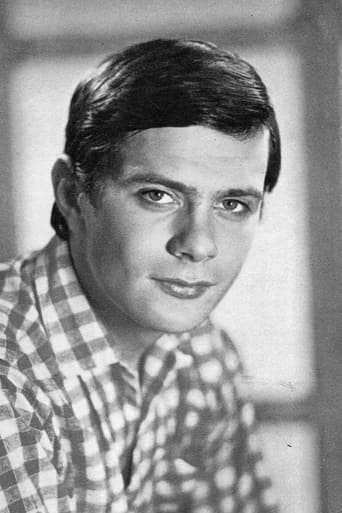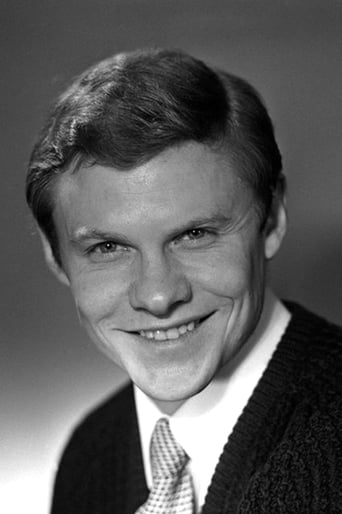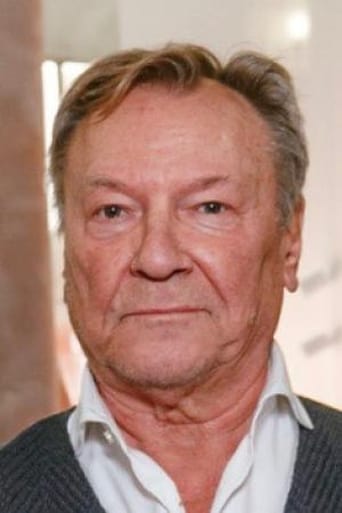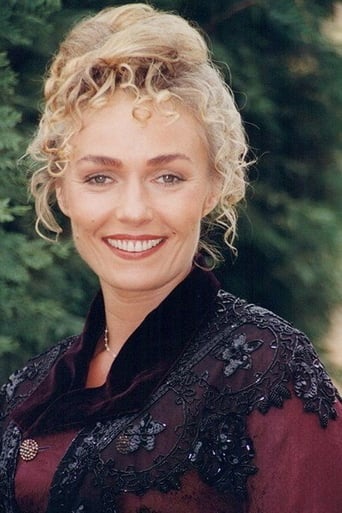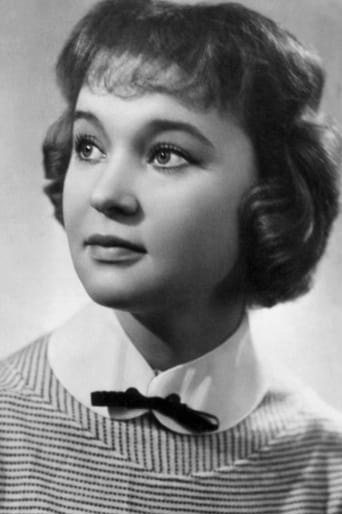Matrixiole
Simple and well acted, it has tension enough to knot the stomach.
Dynamixor
The performances transcend the film's tropes, grounding it in characters that feel more complete than this subgenre often produces.
Zandra
The movie turns out to be a little better than the average. Starting from a romantic formula often seen in the cinema, it ends in the most predictable (and somewhat bland) way.
Geraldine
The story, direction, characters, and writing/dialogue is akin to taking a tranquilizer shot to the neck, but everything else was so well done.
Emil Bakkum
The Russian films from the Soviet era do not really fit in with the European tradition. The tragic history of Russia has left an indelible imprint on the cultural and artistic expressions. For centuries the society was based on an agricultural feudalism. At the start of the twentieth century, the Tsarist regime made an effort to transform into an industrial state. However the arrears was already insurmountable. The country lost several national wars, and already in 1905 a truly revolutionary spirit had seized the leading parts of the Russian people. When the regime was dragged into the first world war, it lost all credibility. When finally the Tsar left, only misery was left. Am I right? The war was followed by the Bolshewist revolution and by a cruel civil war. But worse was to come during the second world war, that was to a large extent fought on the Russian territory, with incredible cruelty from the Nazis. Clearly the early Bolshewist promise of a happy and united future had failed. After WW2 something of an economic miracle developed, including cosmonautics, but it was too little too late. The film follows the lifes of three generations of a Siberian family during those uproarious years. The plot is what is called in German an Aufbau (build up) story. We see how a hamlet of very primitive peasants transforms into an industrial oil district. Indeed one of the main characters has vague dreams about the founding of a "sun city" (which he probably read in a propaganda leaflet). But unlike the upbeat German Aufbau the atmosphere remains depressing. In fact there is not a single scene, that elicits a smile. Amazing, isn't it? In many aspects the characters are trapped by the traditional mysticism and ties with the harsh natural conditions. Life is slow, and so is the film. The plot consists of two parts. In the first part we witness the decay of the agricultural society. The second part describes the settlement of the oil industry. In both cases I find it hard to relate and empathize with the events, even though I had previously seen many an American "Go West" western movie. Probably the story contains lots of interwoven symbolism. For there are obvious hints in a scene of the late fifties, when the main character enters a deserted shack, with Stalin pictures on the wall. However, being a Dutchman I am not sufficiently accessible to possible other signals. What remains is a display of folk customs, which is perhaps amazing, but not really appealing. I can understand that it never became an international block buster.
I B
Siberiade is a magnificent epic. The story takes place mostly in the Siberian village Yelan, near which large deposits of oil lie. Two generations of villagers get caught up in turbulent times, when there was expansion in the Orthodox Civilization. The 1979 film is all about the characters. Well-known Soviet actors were cast in the leading roles, including Oscar winner Nikita Mikhalkov, Natalya Andrejchenko and Vitaly Solomin. Their losses are truly emotional yet they also go through periods of exaltation. The revolution brought hope but difficult struggles followed too. The cinematography by Levan Paatashvili captures the beauty of Siberia's wilderness in a simple but well done manner. Black & white footage of heroic periods in Russia's 20th century history bridge the eras in the characters' lives. Director Andrei Konchalovsky wasn't afraid to show a few uneasy scenes, and there's even a bit of female nudity. Yet his direction is effective and he succeeded in telling an absorbing epic of an interesting time in Russia's history. The film is known for Eduard Artemyev's memorable electronic score. The score was even released internationally, and I heard a piece of it in CNN's Cold War (1998) documentary. Siberiade won the Special Grand Jury Prize at the 1979 Cannes Film Festival, and I highly recommend seeing it.
chaos-rampant
Konchalovsky's towering poem to Siberia doesn't steamroll ahead, though it's 4,5 hours long. It holds back for space, takes time in roundabout exploration of childhood memories in a turn-of-the-century backwoods village, yet it picks up steam doing this, builds in emotional resonance as though even the sounds and images which compose it become imbued by sheer association with their subject matter with that quality of fierce tireless quiet dignity that characterizes the Soviet working spirit. Konchalovsky celebrates Soviet collectivity but in an almost revisionist way to paeans like Soy Cuba and Invincible the mood turns somber and reflective. So eventually the Revolution, the one thought to matter. News of it reach the secluded Siberian village only through the grapevine. Worse with the fruits of its labor, these reach the village only when a world war calls for the young men to enlist.But although the scope appears huge and daunting, Konchalovksy zeroes in on the individual, the face behind the history; with care and affection to examine the bitter longing and regret of the woman who waited 6 years after the war for a fiancé who never came back, waited long enough to go out and become a barmaid in a ship with velvet couches and which she quit years later to come back to her village to care for an aging uncle who killed the fiancé's father with an axe, the irreverent folly of the fiancé who came back from the war a hero 20 years too late, came back not for the sake of the girl he left behind but to drill oil for the motherland, the despair and resignation of the middle-aged Regional Party Leader who comes back to his small Siberian village with the sole purpose of blotting it out of the map to build a power plant. The movie segues from decade to decade from the 10's to the 80's with amazing newsreel footage trailing Soviet history from the revolution to war famine and the titanic technological achievements of an empire (terrific visuals here! pure futurism of kinetic violence and skewed angles and flickering cramped shots of crowds and faces) but the actual movie focuses on the individual, on triumphs and follies small and big. By the second half a sense of bittersweet fatalism creeps in; of broken lives that never reached fulfillment choking with regret and yearning. "It can't matter", seems like the world is saying, to which Konchalovksy answers "it must matter" because the protagonists keep on trying for redemption.Yet behind this saga of 'man against landscape' something seems to hover, shadowy, almost substanceless, like the Eternal Old Man hermit who appears in every segment to guide or repudiate the protagonists, sometimes a mere spectactor, sometimes the enigmatic sage; a little behind and above all the other straightforward and logical incomprehensible ultimatums challenges and affirmations of the human characters, something invisible seems to lurk. Ghosts of the fathers appearing in sepia dreams, repeated shots of a star gleaming in the nightsky, a curious bear, indeed the Eternal Old Man himself; Konchalovksy calls for awe and reverence before a mystical land of some other order. In its treatment of a small backwoods community struggling against nature progress and time and in the ways it learns to deal with them, often funny bizarre and tragic at the same time, and in how the director never allows cynicism to override his humanism, it reminds me of Shohei Imamura's The Profound Desires of the Gods. When, in a dream scene, Alexei tears through the planks of a door on which is plastered a propaganda poster of Stalin to reach out at his (dead) father as he vanishes in the fog, the movie hints at the betrayal of the Soviet Dream, or better yet, at all the things lost in the revolution, this betrayal made more explicit in the film's fiery denouement. The amazing visuals, elegiac and somber with a raw naturalist edge, help seal the deal. By the end of it, an oil derric erupts in flames and the movie erupts in a wild explosion of pure cinema.
gerdak
This is just one of these rare cinema experiences. I've seen this film twice in cinema about 15 years ago. The first time in a stonecold auditorium (they ran out of heating oil) we all just sat there with gloves, jackets and other stuff to keep you warm. The film made such an impact with its beautifull images and its rare story. Russian cinema has a couple of these slow and long movies. Siberiade is a long (over 4 and a half hour) and slow movie. Long shots of man wading through cold swamps in search of oil. I like it!!!! It is a shame there was no videorelease in Europe, and now lets wait for the DVD!! Martin

